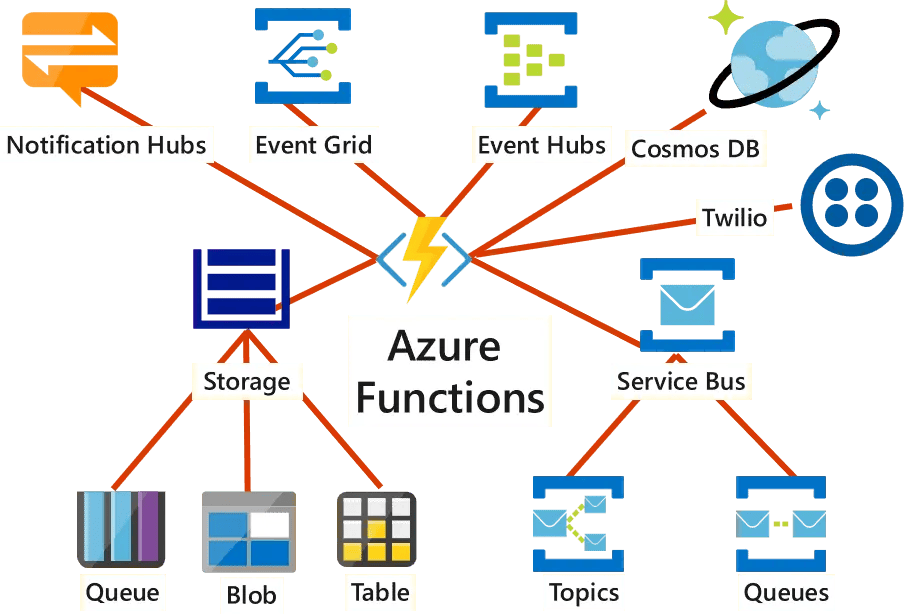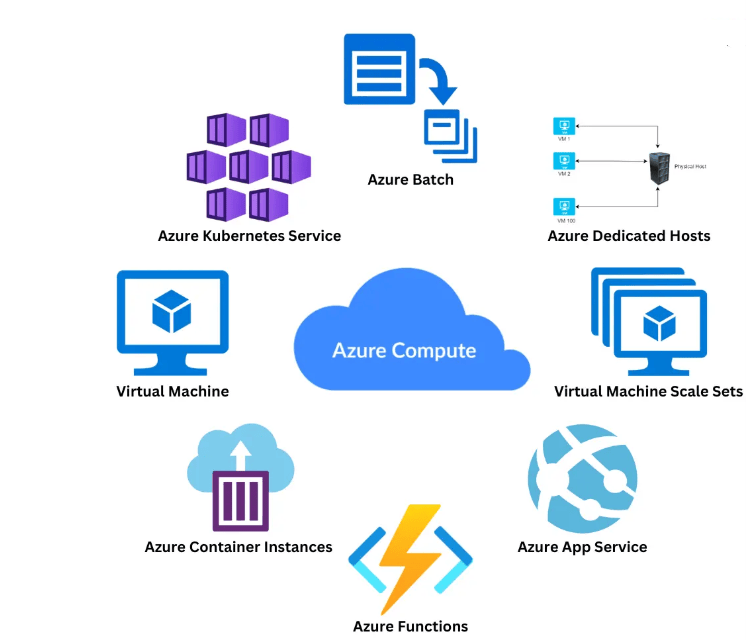
- Introduction to Microsoft Azure
- Core Azure Concepts and Services
- Advanced Azure Topics
- Azure Certification Tracks for 2024
- Learning Resources for Azure
- Practical Applications of Azure Skills
- Future of Azure and Cloud Computing
- Conclusion
Introduction to Microsoft Azure
Microsoft Azure is one of the leading cloud computing platforms, offering a wide range of cloud services, including computing, analytics, storage, and networking. These services are designed to help organizations meet their business challenges. In 2024, Microsoft Azure Training will remain at the forefront of enterprise digital transformation, providing solutions for companies worldwide. The Microsoft Azure cloud platform allows businesses to host applications and data while also providing computing power on demand. In this blog, we will cover the comprehensive syllabus for an Azure course that will equip you with the necessary skills for 2024 and beyond. Whether you’re a beginner or an advanced user, understanding the core concepts, advanced topics, and certification tracks of Azure is essential to keep up with the latest developments in cloud technologies.
Advance your Microsoft Azure career by joining this Microsoft Azure Online Course now.
Core Azure Concepts and Services
Azure Compute Services- Virtual Machines (VMs): A virtualized server that runs in the cloud. You can run a variety of operating systems and applications within a VM, just like a traditional server.
- Azure App Services: A fully managed platform for building, deploying, and scaling web apps. It supports languages like .NET, Java, and Node.js.
- Azure Functions: Serverless computing that allows you to run code without provisioning servers. This helps automate processes without having to worry about infrastructure management.
- Azure Container Instances (ACI): A service for running Docker containers directly in Azure without the need to manage virtual machines or orchestrators.
- Azure Kubernetes Service (AKS): A managed Kubernetes container orchestration service that allows you to deploy and manage containerized applications. Azure Storage Services
- Blob Storage: Object storage for storing large amounts of unstructured data such as images, videos, and logs.
- Azure File Storage: Managed file shares in the cloud, accessible via SMB protocol.
- Azure Queue Storage: A service for storing and managing messages in a queue, useful for decoupling application components.
- Azure Disk Storage: Persistent disk storage for Azure Virtual Machines.
- Azure Data Lake Storage: A scalable data lake solution for big data analytics. Azure Networking
- Virtual Networks (VNets): Allows you to create isolated, private networks within Azure for secure communication between services and virtual machines.
- Load Balancer: Distributes incoming traffic among resources to ensure no single resource is overwhelmed.
- Azure Firewall: A cloud-native firewall for controlling and securing traffic to your Azure resources.
- VPN Gateway: Connects your on-premises networks to Azure via a secure, encrypted connection.
- ExpressRoute: A private connection from your premises to Azure, bypassing the internet.
Azure Storage provides highly scalable and secure data storage solutions. Major storage services in Azure include:
Networking is a vital part of Cloud Security Service . Azure offers several services to ensure seamless networking for applications and resources:
Practical Applications of Azure Skills
The real value of learning Azure comes from applying it to real-world projects. Some practical applications of Azure skills include migrating legacy on-premise applications to the Azure cloud platform, ensuring minimal downtime and optimized resource usage. Azure provides tools, such as Azure Machine Learning and Cognitive Services, for building and deploying AI models. Azure IoT Hub allows you to create scalable solutions for managing and analyzing data from IoT devices. Implementing DevOps practices by utilizing Azure DevOps services such as Azure Pipelines, Azure Repos, and Azure Artifacts. Additionally, Azure offers enterprise-grade security, compliance, and disaster recovery solutions, making it essential for business continuity. Organizations use Azure Virtual Machines, Azure Kubernetes Service (AKS), and Azure Functions to build, deploy, and manage scalable applications efficiently. With Azure Database Security and Cosmos DB, businesses can ensure high availability and performance for their data. Azure Active Directory (Azure AD) enhances identity and access management, providing secure authentication and authorization. Leveraging Azure’s hybrid cloud capabilities, businesses can seamlessly integrate on-premise and cloud resources, ensuring flexibility and cost optimization in their IT infrastructure.
Learn how to manage and deploy cloud services by joining this Microsoft Azure Online Course today.
Advanced Azure Topics
Once you understand the core services, you can dive into advanced Azure topics that will prepare you for complex enterprise-level cloud deployments.
Azure Kubernetes Service (AKS)Azure Kubernetes Service (AKS) is one of the most important services for containerized applications. AKS simplifies deploying, managing, and scaling containerized applications using Kubernetes. In 2024, AKS is increasingly important for DevOps professionals. Key features of AKS include:
- Automatic Scaling: Automatically scale the number of nodes in your cluster based on demand.
- Integrated Developer Tools: Supports CI/CD pipelines, Helm charts, and more.
- Security: Built-in support for Azure Active Directory and role-based access control (RBAC).
- Identity Protection: Security features such as Multi Factor Authentication(MFA) and conditional access.
- Single Sign-On (SSO): Simplifies user access to multiple applications with one set of credentials.
- Role-Based Access Control (RBAC): Ensures users have the right level of access to Azure resources. Azure Security and Compliance
- Azure Security Center: A unified security management system that provides threat protection across all Azure resources.
- Azure Key Vault: A service for securely managing keys, secrets, and certificates.
- Compliance Certifications: Azure complies with various international standards such as GDPR, HIPAA, and ISO 27001, ensuring that you meet regulatory requirements.

Azure Active Directory (AAD) is a cloud-based identity and access management service that helps you securely manage users and resources. AAD integrates seamlessly with other Azure services and third-party applications. In this section, you’ll learn about:
As more organizations move to the cloud, security remains a top priority. Azure provides several tools to help secure your resources and ensure compliance with industry regulations:
Future of Azure and Cloud Computing
In the coming years, the demand for cloud computing solutions like Azure is only expected to grow. Key trends that will shape the future of Azure and cloud computing in 2024 and beyond include Hybrid and Multi-Cloud Solutions. Organizations are adopting hybrid cloud models, where they use both on-premises and Microsoft Azure Training. Azure Arc is a tool that supports hybrid and multi-cloud environments. With the rise of serverless solutions like Azure Functions, companies can focus on code execution rather than managing infrastructure. The integration of AI services like Azure Cognitive Services and Azure Bot Services will continue to expand, driving innovation in automation. Azure IoT and Azure Stack Edge are key services that bring computing power closer to the data source, enabling faster processing of data at the edge of networks. Additionally, enhanced security measures, including Zero Trust frameworks and confidential computing, will strengthen cloud security. The growing focus on sustainability will drive the adoption of energy-efficient cloud data centers. Compliance automation and regulatory adherence will be a priority for businesses. As cloud-native applications rise, containerization and Kubernetes orchestration will further optimize cloud deployments.
Aspiring to lead in Cloud Computing? Enroll in ACTE’s Cloud Computing Master Program Training Course and start your path to success!
Azure Certification Tracks for 2024
In 2024, Azure certifications remain highly valuable for cloud professionals. Microsoft offers a variety of certifications designed for different levels of expertise:
- Fundamentals Certifications: Microsoft Certified: Azure Fundamentals (AZ-900): Ideal for beginners, this certification covers the basics of Azure services, cloud concepts, and Azure pricing models.
- Cloud Security Consultant: Cloud security experts provide consultancy advice to organizations seeking to enhance their cloud security position. They help analyze the current cloud security procedures of an organization, guide it on best practices, and aid in its implementation of Information Security frameworks. This role is suitable for individuals who enjoy interacting with various clients and finding solutions to complex security issues. Associate-Level Certifications:
- Azure Administrator Associate (AZ-104) Microsoft Certified: Designed for cloud administrators. Managing Azure resources, virtual networks, and storage solutions are the main topics of the test.
- Designed for developers, the Microsoft Certified Azure : Developer Associate (AZ-204) credential focuses on creating and implementing Azure applications.
- Azure Security Engineer Associate (AZ-500) Microsoft Certified: This certification focuses on securing Azure environments, controlling access and identity, and implementing security policies. Expert-Level Certifications:
- Microsoft Certified: Azure Solutions Architect Expert (AZ-305): Designed for IT professionals, this certification focuses on designing and implementing Azure solutions.
- Microsoft Certified: Azure DevOps Engineer Expert (AZ-400): This certification is ideal for DevOps professionals who focus on managing the development lifecycle and CI/CD pipelines.
Boost your chances in Microsoft Azure interviews by checking out our blog on Microsoft Azure Interview Questions and Answers!
Learning Resources for Azure

There are numerous resources available for learning Azure. Here are some popular learning platforms and resources to help you on your Azure journey. Microsoft Learn is a free online platform offering learning paths and modules for all Azure services and certifications. It provides structured courses for all levels, covering in-depth topics like Azure DevOps, Kubernetes, and security. Platforms like Coursera, Udemy, and Pluralsight offer Azure courses from institutions such as Microsoft, the University of Colorado, and more.Several books are available for learning Azure, such as “Exam Ref AZ-900 Microsoft Azure Fundamentals” by Jim Cheshire and “Azure for Architects” by Ritesh Modi. Additionally, hands-on labs, webinars, YouTube tutorials, and community forums provide practical learning experiences. Azure Sandbox environments allow learners to practice real-world scenarios without incurring costs. Microsoft Certification programs, such as Azure Administrator Associate (AZ-104) and Endpoint Security Solutions, help professionals validate their expertise. Tech conferences and workshops also offer insights into emerging Azure technologies. Engaging with the Azure Developer Community and following blogs like Microsoft Azure Blog can keep learners updated with the latest advancements in cloud computing.
Conclusion
Gaining expertise in Microsoft Azure by 2024 will put you on the way to being a skilled cloud specialist. Azure has an extensive ecosystem that can meet almost any IT requirement, with services covering computing, networking, storage, security, artificial intelligence (AI), and database management. Understanding Azure’s fundamental concepts, advanced topics, and real-world applications will help you stay competitive in the rapidly evolving cloud computing industry. Whether your goal is certification, career advancement, or hands-on cloud deployment, mastering Azure will provide a strong foundation for Microsoft Azure Training , DevOps practices, cost optimization, and cybersecurity in modern enterprise environments. Azure’s broad service offerings allow organizations to build scalable, secure, and high-performance applications while maintaining operational efficiency. As businesses increasingly migrate to the cloud, professionals with deep Azure knowledge are in high demand. Learning about virtual machines, containerization, serverless computing, and hybrid cloud models will enhance your ability to design and manage cloud solutions effectively. Additionally, expertise in identity management, compliance frameworks, and threat protection ensures robust security for cloud-based infrastructures. By gaining hands-on experience through labs and projects, professionals can develop the practical skills needed to optimize and troubleshoot Azure environments efficiently.





